My sunscreen faves 🌞 and a supplement for skin
Plus, a website for verifying your sunscreen's efficacy
Hi friends! Are you headed anywhere for spring break? I’m attending a wedding in New Orleans next week and romanticizing warmer weather.
Normally we’d only travel for the wedding weekend, but we decided to make a week of it since 1) we have a friend who’s kind enough to host, and 2) I’ve never been to NOLA! If you’ve been, wanna share recommendations for affordable activities in the comments? An alligator tour with Lana Del Rey’s husband is, unfortunately, out of budget.
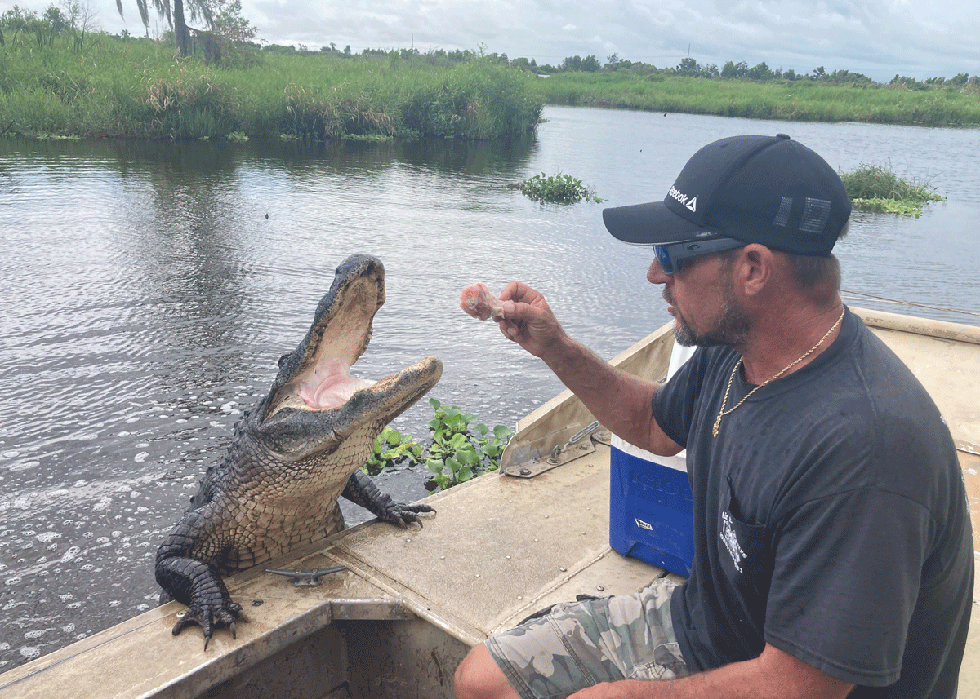
Earlier this month I spent two weeks in Korea, dutifully cold-plunging with my 91 year old grandmother in Seoul. Walking to the neighborhood bathhouse with her and spending all morning in community care is one of my favorite rituals.
Friends have been imploring me to write about Korean beauty treatments and products — and I do have a letter in the works for next week!
But first: are you wearing sunscreen? My nonagenarian grandma’s chest looks amazing; literally less wrinkly than mine. I wish I was kidding. (This is the kind of thing you suddenly notice one day, after 30+ years of seeing your grandmother naked at the bathhouse.)
And she’s not buying some $136 retinol neck and chest cream, which I’ve seriously considered in my more monied moments when a friend swore by it. No, my grandma's skincare secret is consistent sun protection, like wearing a hat and a giant cotton t-shirt at the beach over her swimsuit. Was it for modesty or sun protection?
So Korean beauty tip number 1: wear sunscreen and a hat on your spring break, maybe even cover your shoulders between 10am and 3pm — to prevent more damage to your face, neck and chest than any $136 cream can!
🌞 Sunscreens 🧴
If you’re lathering up at all, look out for UVA coverage. UVB ( 280-315 nm) gives you a tan slash cancer, which is what American sunscreens protect you from, but UVA (314-400 nm) is what penetrates into the dermis and causes deeper damage. If you want beauty product recs, I’m guessing you prefer to avoid both.
During COVID, I wore EltaMD UV Clear SPF 46 on the daily. It was recommended by so many blogs and easily accessible, lauded as both a chemical and physical sunscreen. But after getting burnt at the park one summer day… I realized EltaMD is not it!
This Sunscreen Tester site uses a machine to test each sunscreen, and the results are fascinating. EltaMD’s UV Clear SPF 46 performed badly, which devastated the group chat but confirmed some suspicions:
Heads up: There are a lot of fakes for Korean sunscreens on Amazon. With RoundLab I see the strange font and the fact that there are no spaces between the Korean words, but there are probably more convincing fakes so be careful out there.
Facial sunscreens I like for every day:
Round Lab - Birch Juice Moisturizing Sun Cream SPF 50+ PA++++ ($15 for 50ml) I love this for daily use. It performed really well on Sunscreen Tester and is hydrating without being greasy.
THANK YOU FARMER - Sun Project Skin Relief Sun Cream SPF 50+ PA++++ ($19 for 50ml) Nour prefers this sunscreen for his oily skin. It performed well on Sunscreen Tester, but not as well as Round Lab. $33 for two if you have a Costco membership!
ILIA super serum skin tint SPF 40 ($48 for 38ml) performed surprisingly well on Sunscreen Tester, so on winter days I’ll wear this without sunscreen underneath. Comes in 26 shades.
SPF 30 lip gloss ($24) in Rosy is a bit browner than I expected, but I like getting some color with the SPF.
Facial sunscreens I like for vacation:
Nour wears unscented and flavorless SPF 30 lip balm ($12) for sun and ski.
I don’t love the strawberry fragrance but for $12, this clear SPF 50 lip gloss is a good one! Just don’t let it get in your mouth.
I use ISDIN Actinica SPF 50 ($58) for hot, sunbathing weather when I’m sweating outside all day. I discovered it at a pharmacy in Barcelona on a beach day; it is an excellent mineral sunscreen and will last you months. But then I saw it rated red on EWG, which found two concerns based on the ingredient list:
I’m not concerned with either of these flags for personal use, because it’s not flagging a specific ingredient that’s bad, rather, the combination of ingredients. Sometimes you need a serious, heavy duty sunscreen, and for me this is it.
In general, I try to find sunscreens that look good on EWG and Sunscreen Tester, and if we’re going in the water, reef-safe as well. According to SavetheReef.org, reef safe sunscreens are free of:
Oxybenzone
Octinoxate
Octocrylene
Homosalate
4-methylbenzylidene camphor
PABA
Parabens
Triclosan
Any nanoparticles or “nano-sized” zinc or titanium (if it doesn’t explicitly say “micro-sized” or “non-nano” and it can rub in, it’s probably nano-sized)
Any form of microplastic, such as “exfoliating beads”
Solara Suncare Go! Mineral Defense SPORT Superfruit Body Sunscreen, SPF 50 ($20 for 147ml) is one of the few that are SPF 50 with broad spectrum UVA and UVB protection, EWG verified AND under $25!
But is it actually good sunscreen? I emailed Sunscreen Tester to request they test Solara’s efficacy. They responded that Silky Crunch must Venmo $ to cover the cost of the sunscreen and shipping, but then the information would be published and available to us all :) Yay citizen journalism!
Update on March 27, 2025: Womp womp, the Solvana Suncare Go! provides some protection, but not as much as I would like.
Last summer I relied on the Trader Joe’s Mineral Sunscreen for my body, but the performance was not great and it’s so thick, I didn’t sunscreen as often as I should have 🙁 so I’m ready for a quality body sunscreen this year that won’t break the bank!
Adrian from Sunscreen Tester recommends Thrive Bodyshield SPF 50 ($30 for 171 ml) (Thrive, Amazon) for a reef-safe, non-nano zinc, broad spectrum mineral sunscreen. That’s what I’m ordering next. Pine resin instead of synthetics for water resistance!
🌞 Sun Protection Supplement 💊
When I travel to locales with a high UV index (for me, anything above 7) I supplement with a non-synthetic astaxanthin, derived from algae.
Astaxanthin is the carotenoid that gives lobster and shrimp their red-orange color, so naturally present in certain foods. I don’t take it year-round, but add to my supplement stack two weeks before a sunny trip (including skiing) to build up an internal “tan.” I can get really red and dry even when wearing sunscreen, and astaxanthin helps.
There’s been supporting evidence that the carotenoid supplement “improves UV-induced skin deterioration” in a clinical trial in Japan. If you’re a nerd it might be a fun read, they had a surprisingly analog methodology for assessing “redness” but did use a machine to assess skin moisture. Skin patches of subjects in the astaxanthin group were less red and less dehydrated compared to those in the placebo group.
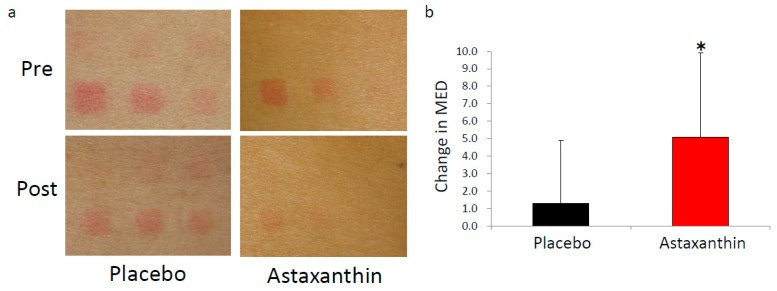
According to a review of the literature, it’s also great for repairing DNA damage in the eyes and skin. I gifted it to my dad in Korea who “doesn’t believe” in sunscreen 🫠
After reviewing 60 studies, the reviewers conclude:
“The significant antioxidant, anti-inflammatory, neuroprotective, skin-protective, immunomodulator, antimicrobial, and anticancer activity, as well as the ability to improve lipid metabolism, make ASX a promising compound for the prevention or even treatment of different health conditions.”
Do your own research to see if it’s right for you. They always say, ask your doctor! I actually asked my doctor though, and she told me all supplements are a waste of time and money 😅
Any sunscreens you rec, or wanna de-influence us from?


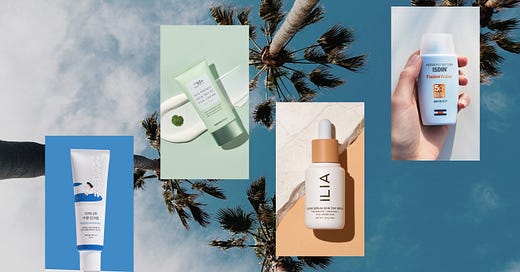






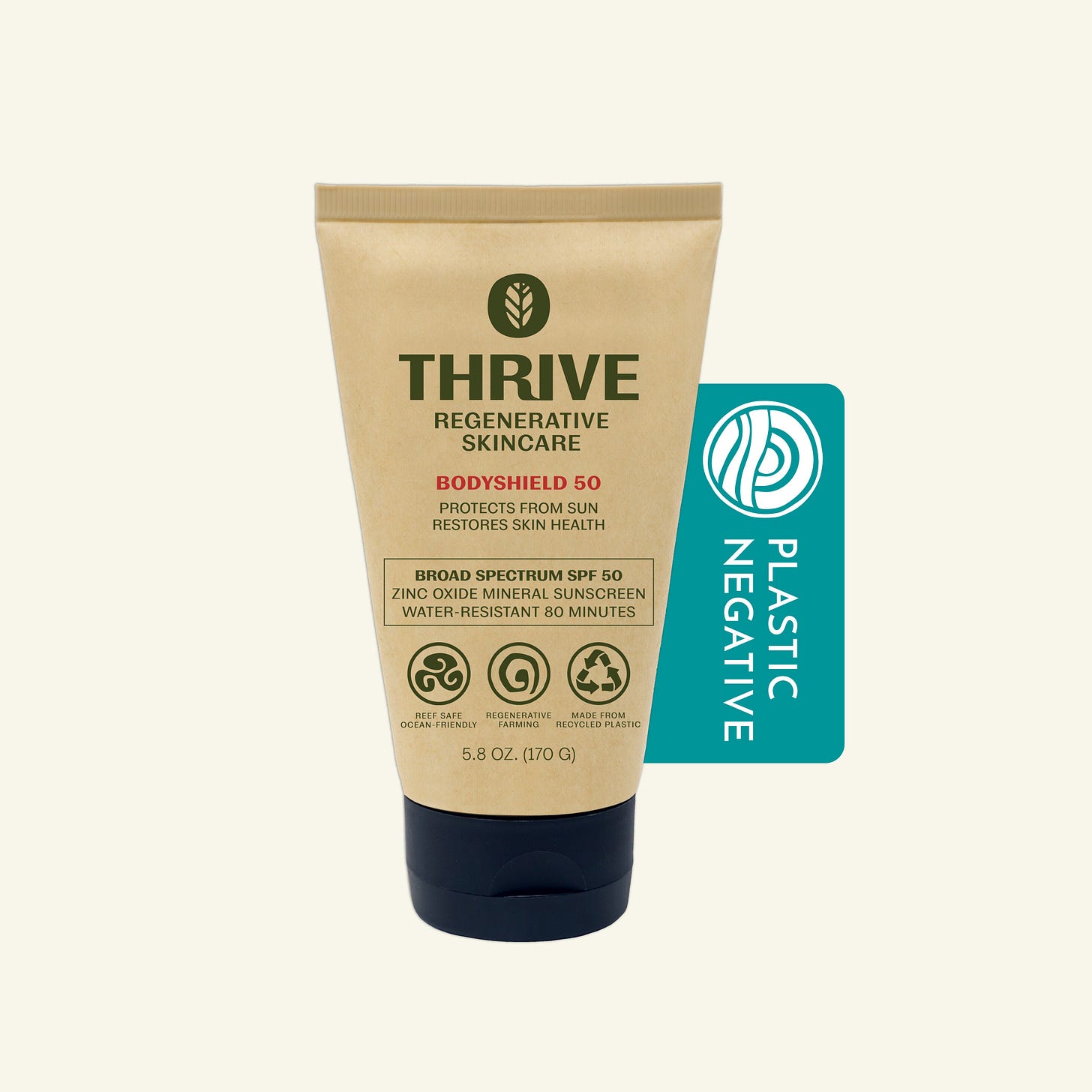
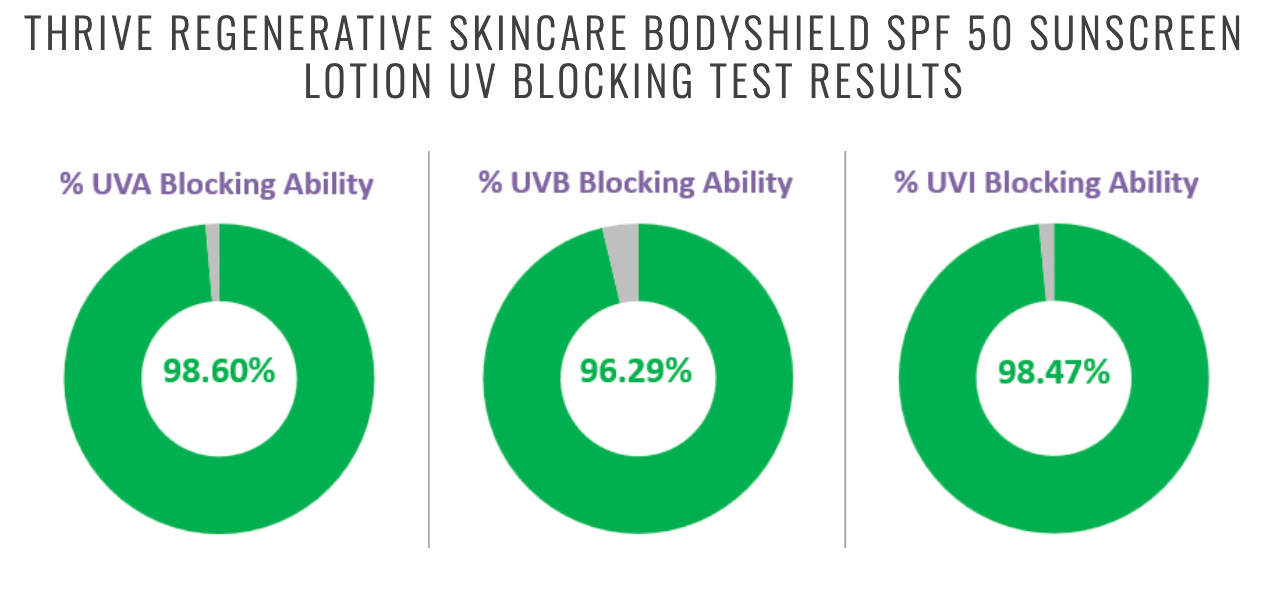

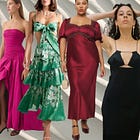

I've been using the Badger Sport Sunscreen and am really happy with it.
Pros: It's in a tin, so travel and earth friendly, SPF 40 or 50, clear!, reef safe and works perfectly well alone or under make up.
This is so helpful, thank you—my previous go-to sunscreen (Supergoop PLAY SPF 50 PA++++) is unfortunately a chemical one that only got a so-so rating on EWG's Skin Deep, so I've been looking for alternatives and this is such a great roundup! I honestly got a bit overwhelmed trying to go back and forth between EWG and Sunscreen Tester—but it looks like your top products do well in both sets of criteria, which is great.
I would also love to know your thoughts/recommendations for UPF clothing—so much of it is synthetic, and the all-natural ones I've found are really expensive! Would be really interested in your take/recs in that area :)